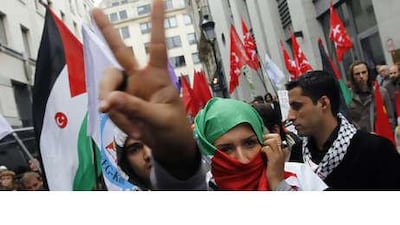ASHDOD, ISRAEL // Israel faced a wave of international condemnation yesterday after its commandos killed at least nine peace activists in a night-time raid on a flotilla of boats carrying humanitarian aid to the Gaza Strip. The protests were headed by Turkey, where the charity sponsoring the aid convoy is based and where most of the 700 activists on board came from, including those killed. Ankara recalled its ambassador to Israel and Recep Tayyip Erdogan, the prime minister, denounced the raid as "state terrorism".
Turkey also cancelled planned joint military exercises with Israel and called for an emergency session of the UN Security Council, which was under way last night. Benjamin Netanyahu, the Israeli prime minister, was forced to pull out of a meeting with Barack Obama, the US president, planned for today and return home to deal with the diplomatic fall-out. Mr Obama voiced "deep regret" over the incident and "expressed the importance of learning all the facts and circumstances", the White House said.
The UAE condemned Israel's "inhumane and criminal" use of force. Sheikh Abdullah bin Zayed, the Foreign Minister, said: "The deaths of innocent civilians working to deliver basic humanitarian aid to the Palestinian people in Gaza is a clear violation of international law and a moral outrage of the highest order. Such an incident should not pass uncensored and Israel must face the consequence of its actions."
The GCC Secretary-General Abdel Rahman al Attiya said the attack should be considered "a war crime". The European Union's foreign affairs chief, Catherine Ashton, demanded an inquiry. The British foreign secretary, William Hague, deplored the killings and called for an end to the Gaza blockade. There were also diplomatic protests in Greece, Egypt, Sweden, France, Spain and Denmark, where Israeli ambassadors were summoned for explanations.
Mahmoud Abbas, the Palestinian Authority president, denounced Israel's "aggression" and called for three days of mourning. It is not clear how the incident will affect US-mediated proximity talks between Israel and the Palestinians. Ghassan Khatib, the director of the Palestinian Government Media Office, said the reason Israel and the Palestinians were not negotiating directly was "precisely because" of such Israeli actions. "As long as international actors do not apply serious pressure on Israel to abide by international law, Israel will continue to act with impunity."
In the raid, just before dawn yesterday, Israeli commandos dropped from helicopters on to the largest vessel in the six-boat flotilla. The Israeli army claimed the soldiers were attacked with steel pipes and knives and opened fire only after two guns were wrestled from soldiers and discharged. Seven soldiers were injured, two seriously, the army said. Activists said soldiers opened fire first before they boarded the ship, and pointed out that the flotilla was intercepted well outside Israeli territorial waters. Ismail Haniyeh, the Hamas prime minister, called on the Palestinian Authority "to halt negotiations, direct or indirect, with Israel because of this crime".
Entering the emergency meeting of the UN Security Council yesterday, Riyad Mansour, the Palestinian ambassador to the UN, said: "We call collectively as Arabs, and also Turkey and all of our friends in the Security Council, for an independent international investigation to know who gave the orders from the Israeli side to open fire against civilians and to bring those people to face justice." Israel maintains that the flotilla had been warned to stay away and that the organisers had deliberately provoked violence. "They were looking for confrontation, they were looking for this kind of outcome," said Mark Regev, a spokesman for the Israeli government. He said the flotilla had been offered alternatives to bring the aid to Gaza through Israeli or Egyptian ports.
Israel had said last week it would process the 10,000 tonnes of aid on board the ships and send it on unless it was on a list of materials that Israel bars from entering Gaza. That would have precluded at least the cement the boats were carrying. Organisers had already said their effort was about more than delivering humanitarian aid. In a statement released just before the raid, an activist on board one of the aid ships, Lubna Marsawa, said the flotilla was doing "what our governments have failed to do: challenge Israel's right to collectively punish 1.5 million people in Gaza".
The violent turn of events took most observers by surprise. There have been six previous attempts at breaking Israel's blockade on Gaza by sea, all of which were resolved, one way or another, peacefully. That this time it spiralled out of control was evidence of a "tactical failure" by the Israeli army, said Yossi Alpher, an Israeli analyst, who said the army should have foreseen a violent response. More broadly, however, he said the incident was the consequence of a corrupt Israeli strategy in Gaza.
"This is an extension of Israel's economic warfare on Gaza, and that strategy is a failure. It was almost inevitable that a negative outcome like this would happen." All six boats were towed into the southern Israeli port of Ashdod, where Israeli authorities stood ready to "process" the over 600 international activists and either deport them directly from Tel Aviv's Ben Gurion Airport, or detain them, should they refuse to leave.
Reporters were being kept away from the port area, and communications with activists on-board the boats had been cut since the raid, which took place some time around four in the morning. This left Israel's official narrative of events on board to dominate news reports throughout the day. There were no details on the identities of the dead or injured. okarmi@thenational.ae * With additional reporting by James Reinl at the United Nations and Zoi Constantine in Dubai

